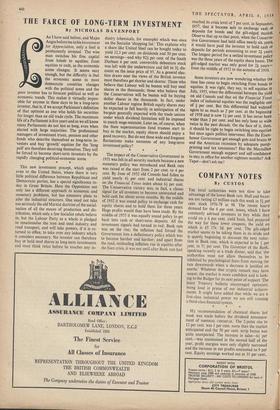THE FARCE OF LONG-TERM INVESTMENT
By NICHOLAS DAVENPORT As I have said before, and Major Angas before me in his Investment for Appreciation, only a fool is permanently invested. The wise man switches his free capital from bonds to equities, from equities to cash, as the economic scene changes. It seems easy enough, but the difficulty is that the economic scene in most democratic countries changes with the political scene and the poor investor has to forecast political as well as economic trends. This makes it virtually impos- sible for anyone in these days to be a long-term investor, that is, if we accept Parkinson's definition of that optimist as one who holds his securities for longer than an old trade cycle. The maximum life of a Parliament is five years and as we all know many Parliaments do not last so long, even when elected with large majorities. The professional managers of investment trusts, pension and other funds who describe themselves as long-term in- vestors and buy 'growth' equities for the 'long pull' are therefore deceiving themselves. They will be forced to become short-term investors by the rapidly changing political-economic scene.
* * *
This new investment precept, which applies even to the United States, where there is very little political difference between Republican and Democratic parties, has a special significance to- day in Great Britain. Here the Opposition not only has a different approach to economic and monetary problems, but has extensive plans to alter the industrial structure. One need not take too seriously the old Marxist doctrine of the social- isation of all the means of production and dis- tribution, which only a few Socialist rebels believe in, but the Labour Party as a whole is pledged to renationalise the iron and steel industry and road transport, and will take powers, if it is re- turned to office, to take over any industry which it considers necessary. No investor can therefore buy or hold steel shares as long-term investments and must think twice before he touches any in-
dustry (chemicals, for example) which was once on the Socialist 'shopping list.' This explains why a share like United Steel can be bought today to yield 12.3 per cent. on dividends and 50 per cent. on earnings—and why 924 per cent. of the South Durham 6 per cent. convertible debenture stock was left with the underwriters and fell to 34 dis- count on the issue price of 95. As a general elec- tion draws near the views of the British investor must therefore get shorter and shorter. Those who believe that Labour will be beaten will buy steel shares in the thousands; those who believe that the Conservatives will be beaten will be buying dollar shares in the thousands. In fact, under another Labour regime British equity shares may be expected to fall heavily in anticipation of the bargain generally expected with the trade unions under which dividend limitation will be imposed to match wage restraint. Later on, of course, when the State superannuation fund trustees start to buy in the market, equity shares should enjoy a good recovery. But do not these wide and frequent fluctuations make nonsense of any long-term investment policy?
* * *
The impact of the Conservative Government in 1951 was felt in all security markets because a new monetary policy was introduced and Bank rate was raised at the start from 2 per cent. to 4 per cent. By June of 1952 old Consols had fallen to yield nearly 44 per cent. and industrial shares on the Financial Times index about 64 per cent. The Conservative victory was, in fact, a classic signal for all investors to become uninvested and hold cash for about seven months. By the middle of 1952 it was sound policy to exchange cash for equity shares and to hold them for three years. Huge profits would then have been made. By the middle of 1955 it was equally sound policy to get back into cash or short-term deposits. All the investment signals had turned to red; Bank rate was on the rise; the inflation had forced the Government into a deflationary policy which was to become harsher and harsher; and apart from the mad, misleading inflation rise in equities after the Suez crisis, it was not until after Bank rate had
reached its crisis level of 7 per cent. in September, 1957, -that it became safe to exchange cash or deposits for bonds and the gilt-edged market. Observe that up to that point, when the Conserva- tive Government had held office nearly six year* it would have paid the investor to hold cash or deposits for periods amounting to over 21 years. The longest period for a settled investment policy was the three years of the equity share boom. The gilt-edged market was only good for 21 years— from the middle of 1952 to the autumn of 1954.
Some investors are now wondering whether the time has come to begin switching from bonds to equities. It was right, they say, to sell equities in July, 1955, when the differential between the yield on old Consols and that on the Financial Times index of industrial equities was the negligible one of # per cent. But this differential had widened again to as much as 2 per cent. at the beginning of 1958 and is now If per cent. It has never been wider than 2 per cent. and has only been so wide twice in the past decade. On the face of it, then, it should be right to begin switching into equities but once again politics intervenes. Has the Eisen- hower Government got enough guts and brains to end the American recession by adequate pump- priming and tax remissions? Has the Macmillan Government enough support and self-confidence to stay in office for another eighteen months? Ask Taper—don't ask me!






























 Previous page
Previous page